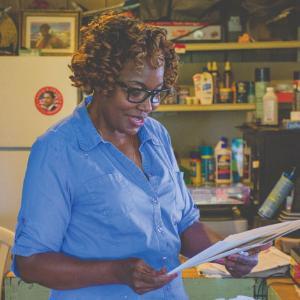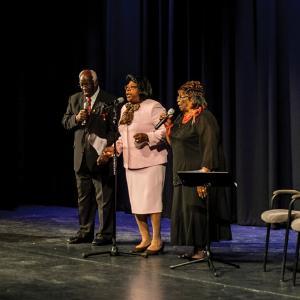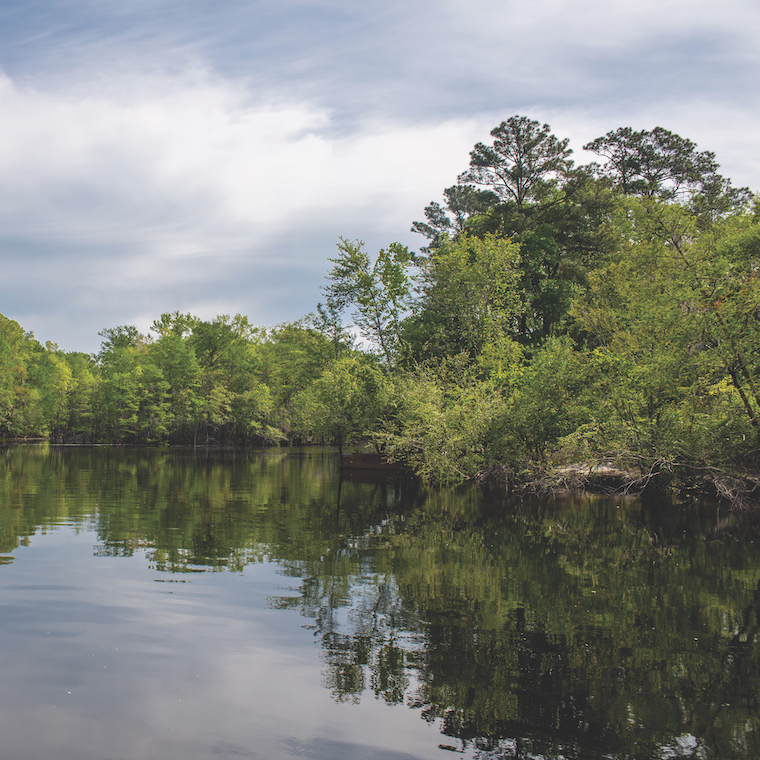Forging Connections
CCU faculty awarded National Archives grant for the Gullah Geechee Digital Project
The story, like the people, has been fragmented, scattered and dispersed. Pieces of the story have grown roots where they landed and produced a world of cultural artifacts: songs, letters, photos, recordings and artistic pieces.
 Some of these elements of West and Central African culture still exist in areas along the coast of the Carolinas, Georgia and Florida, where Gullah Geechee people settled after being brought to America as slaves and where they continue to live. Other artifacts have been uncovered by researchers and are currently housed in archived collections at various universities or the Library of Congress.
Some of these elements of West and Central African culture still exist in areas along the coast of the Carolinas, Georgia and Florida, where Gullah Geechee people settled after being brought to America as slaves and where they continue to live. Other artifacts have been uncovered by researchers and are currently housed in archived collections at various universities or the Library of Congress.
However, there are two shortcomings in the current state of Gullah Geechee cultural artifacts: First, they’re inaccessible to the public, and second, many people and descendants of people who produced them are unaware that they’ve been “discovered” and archived.
Two CCU Gullah scholars have been awarded a grant from the National Archives and Records Administration titled “The Gullah Geechee Digital Project” that seeks to resolve both of these issues.
 Alli Crandell, director of the Athenaeum Press, and Eric Crawford, musicologist and director of CCU’s Charles Joyner Institute for Gullah and African Diaspora Studies, have begun work on a two-year grant of $270,327 to make Gullah historical records accessible to the public and available to the community members who produced them.
Alli Crandell, director of the Athenaeum Press, and Eric Crawford, musicologist and director of CCU’s Charles Joyner Institute for Gullah and African Diaspora Studies, have begun work on a two-year grant of $270,327 to make Gullah historical records accessible to the public and available to the community members who produced them.
The grant work will involve digitizing current collections at the Library of Congress, South Carolina Historical Society and the Association for Cultural Equity — including 6,900 pages of text, 90 hours of audio and six hours of films — and creating a singular digital website, or finding guide, for materials. In addition, the grant will provide for making connections with community members to inform them of the holdings, seek their expertise in interpreting the pieces, and repatriate items that are held without the owner’s knowledge.
“Plantation owners on these islands kept records … on slave families, on health, on planting techniques, on many elements of their lives,” said Crawford. “So we’re going to have all that information. After we digitize it, we’ll be asking, ‘What does that mean? What does it tell us about this culture, and how does it fit in to the bigger story?’”
Making connections between Gullah people and researchers who study the culture is a key component of the work.
“It’s important that we join together the scholarship with the practical aspects of the culture,” said Crawford.
The grant grew from a 2017 project created by The Athenaeum Press, CCU’s student-driven publishing lab, called “Gullah: Voice of an Island,” a recording of 80 hours of Gullah spirituals and stories, created in conjunction with Penn Center and churches on St. Helena Island. The grant work will involve experiential learning classes through The Athenaeum Press.
 CCU’s first Gullah Geechee conference, which was held in March 2019 and drew more than 500 participants, provided a preliminary step for the grant by gathering scholars and community members in one place. Also, it brought representatives from the Library of Congress together with descendants of legendary singer Lillie Knox for a repatriation ceremony, in which original and digitized recordings were returned to the Knox family.
CCU’s first Gullah Geechee conference, which was held in March 2019 and drew more than 500 participants, provided a preliminary step for the grant by gathering scholars and community members in one place. Also, it brought representatives from the Library of Congress together with descendants of legendary singer Lillie Knox for a repatriation ceremony, in which original and digitized recordings were returned to the Knox family.
“I think for me it was kind of a preview,” said Crandell. “These are the ways we can involve family members and community members in the digital archival process, and think about how much richer the story will be with their input.”
For more information on the Joyner Institute, or to offer support for CCU’s 2020 Gullah Geechee Conference, visit coastal.edu/joynerinstitute/give.








